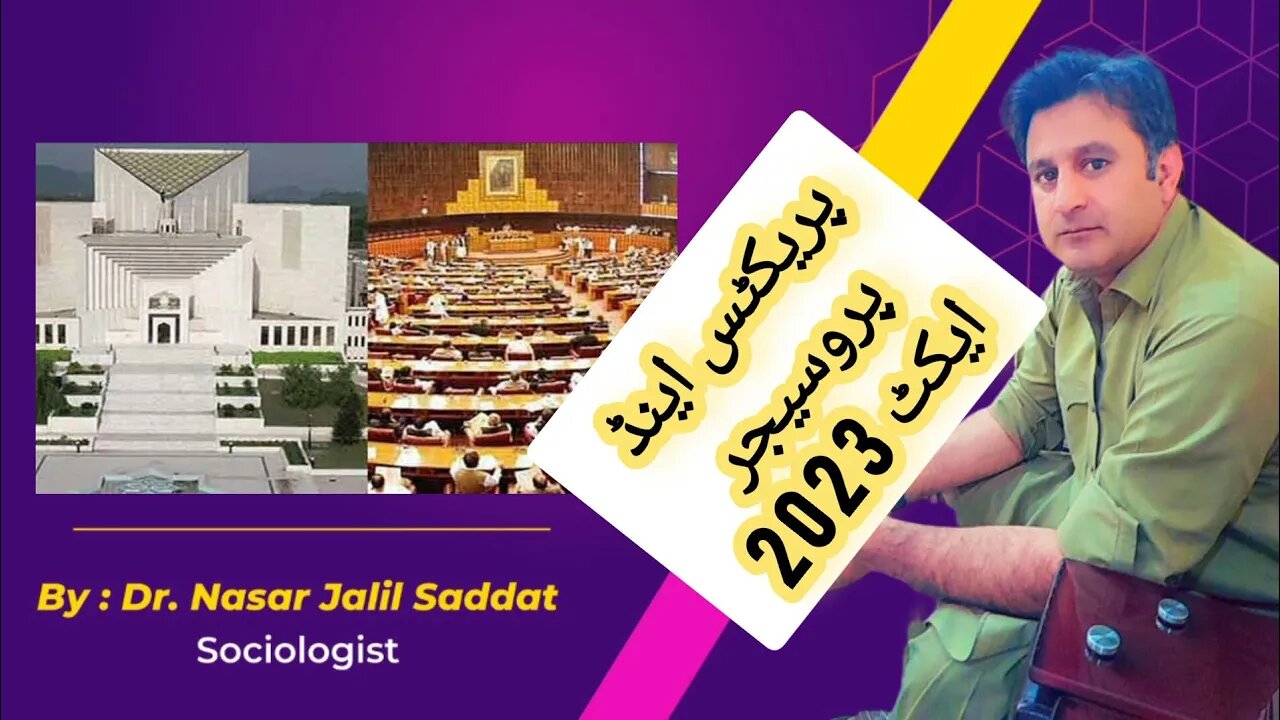Premium Only Content

Practice and Procedure Act 2023 & Supreme Court Verdict | Pakistan
The Supreme Court on Wednesday dismissed the petitions against the Practice and Procedure Act, and sustained the law with a majority of 10-5.
A full court bench comprising 15 judges, head by Chief Justice of Pakistan (CJP) Qazi Faez Isa, pronounced the judgement that was reserved earlier in the day after five consecutive hearings. The law was deemed in accordance with the Constitution.
According to the verdict, the right to appeal will not apply retroactively. The clause seeking application of the right to appeal on past decisions has been voided with 8-7 majority, while the chief justice dissented from the decision.
The right to appeal in decisions of suo motu cases under Article 184(3) has been sustained with a 6-9 majority.
Justice Ijazul Ahsan, Justice Mazahar Naqvi, Justice Muneeb Akhtar, Justice Ayesha Malik were among the dissenters of the 10-5 verdict.
With this decision, the Supreme Court (Practice and Procedure) Act stands enforced.
What is Supreme Court (Practice and Procedure) Act 2023?
The Supreme Court (Practice and Procedure) Act 2023 is a controversial piece of legislation that was passed by the Parliament in April 2023.
The Act aims to address concerns about the chief justice of Pakistan's authority, procedures, and discretionary powers, particularly in relation to suo moto proceedings and the composition of benches for hearing crucial constitutional issues.
Background
On April 10, 2023, the Parliament passed the Supreme Court (Practice and Procedure) Bill 2023.
This proposed law would establish a panel of the most senior judges, led by the chief justice of Pakistan, to handle and conclude all cases, appeals, and issues presented before the top court.
The bill was introduced by then-law minister Azam Nazeer Tarar.
On March 29, 2023, the National Assembly (NA) passed the legislation without referring it to the relevant standing committee.
This came one day after the Senate approved the bill.
President Arif Alvi returned the bill to Parliament twice, asking for further consideration.
However, on April 10, 2023, the bill was passed again with some modifications, amidst a noisy protest by Pakistan Tehreek-e-Insaf (PTI) lawmakers.
The passage of the act was prompted by a legal dispute between the previous government and the superior judiciary over important constitutional qquestion s.
The Supreme Court on Wednesday dismissed the petitions against the Practice and Procedure Act, and sustained the law with a majority of 10-5.
A full court bench comprising 15 judges, head by Chief Justice of Pakistan (CJP) Qazi Faez Isa, pronounced the judgement that was reserved earlier in the day after five consecutive hearings. The law was deemed in accordance with the Constitution.
According to the verdict, the right to appeal will not apply retroactively. The clause seeking application of the right to appeal on past decisions has been voided with 8-7 majority, while the chief justice dissented from the decision.
The right to appeal in decisions of suo motu cases under Article 184(3) has been sustained with a 6-9 majority.
Justice Ijazul Ahsan, Justice Mazahar Naqvi, Justice Muneeb Akhtar, Justice Ayesha Malik were among the dissenters of the 10-5 verdict.
Read about hearing here.
With this decision, the Supreme Court (Practice and Procedure) Act stands enforced.
What is Supreme Court (Practice and Procedure) Act 2023?
The Supreme Court (Practice and Procedure) Act 2023 is a controversial piece of legislation that was passed by the Parliament in April 2023.
The Act aims to address concerns about the chief justice of Pakistan's authority, procedures, and discretionary powers, particularly in relation to suo moto proceedings and the composition of benches for hearing crucial constitutional issues.
Background
On April 10, 2023, the Parliament passed the Supreme Court (Practice and Procedure) Bill 2023.
This proposed law would establish a panel of the most senior judges, led by the chief justice of Pakistan, to handle and conclude all cases, appeals, and issues presented before the top court.
The bill was introduced by then-law minister Azam Nazeer Tarar.
On March 29, 2023, the National Assembly (NA) passed the legislation without referring it to the relevant standing committee.
This came one day after the Senate approved the bill.
President Arif Alvi returned the bill to Parliament twice, asking for further consideration.
However, on April 10, 2023, the bill was passed again with some modifications, amidst a noisy protest by Pakistan Tehreek-e-Insaf (PTI) lawmakers.
The passage of the act was prompted by a legal dispute between the previous government and the superior judiciary over important constitutional questions.
The government argued that the Supreme Court was overstepping its bounds and interfering in executive and legislative affairs.
-
 LIVE
LIVE
Inverted World Live
3 hours agoHaunted Dolls Hack Amazon Alexa | Ep. 98
12,414 watching -
 LIVE
LIVE
Laura Loomer
3 hours agoEP140: Loomer EXPOSES Islamification At US State Department
999 watching -
 3:05:00
3:05:00
TimcastIRL
3 hours agoTrump Floats Accepting 600,000 Chinese Student Visas, MAGA Uproar | Timcast IRL
146K92 -
 DVR
DVR
SpartakusLIVE
9 hours ago$20,000 Hide and Seek Tourney w/ Stonemountain64 || #1 Rat wins the BIG CHEESE
42.2K -
 2:34:02
2:34:02
Barry Cunningham
4 hours agoLISA COOK | ADAM SCHIFF | LETITIA JAMES | ARE THEY BEING SACRIFICED BY THE DEEP STATE?
53.5K34 -
 DVR
DVR
Flyover Conservatives
12 hours agoOnly 17% of Millennials Hit These 5 Adult Milestones—Why?; What If Childhood Trauma Is Behind Your Health Problems? - Dr. Troy Spurrill | FOC Show
10.1K2 -
 4:49:04
4:49:04
HogansAlleyHero
14 hours ago💥CHASING DOPAMINE💥✅TRUMP SAYS BATTLEFIELD IS THE BEST✅
12.9K -
 1:57:40
1:57:40
MattMorseTV
5 hours ago $6.62 earned🔴Trump just SHATTERED the PROJECTIONS.🔴
34.3K27 -
 2:32:19
2:32:19
megimu32
3 hours agoOTS: From Star Search to Superstardom
18.8K4 -
 1:56:21
1:56:21
Joker Effect
2 hours agoInterviewing GREENMAN! Looks like he is coming to Rumble! Let's give him a warm welcome! REAL TALENT
10.4K1